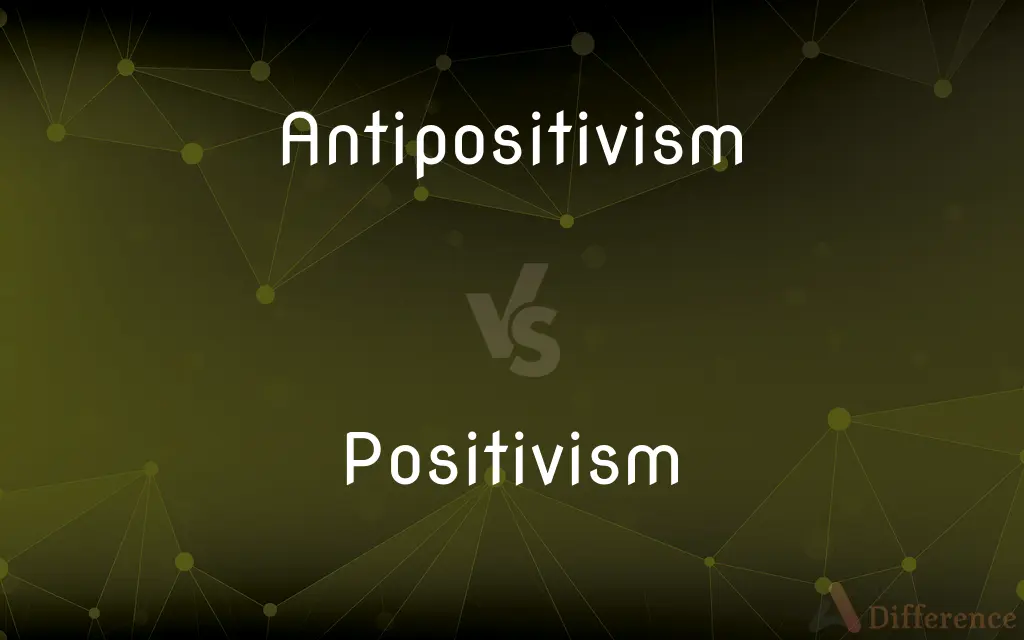Antipositivism vs. Positivism — What's the Difference?
By Maham Liaqat & Urooj Arif — Updated on April 8, 2024
Antipositivism emphasizes understanding human behavior through culture, context, and subjective experience, opposing positivism's focus on observable, measurable phenomena using scientific methods.

Difference Between Antipositivism and Positivism
Table of Contents
ADVERTISEMENT
Key Differences
Antipositivism, rooted in the humanistic and interpretive approaches, argues that the richness of human experience cannot be fully understood through quantifiable data alone. It suggests that social phenomena are best explored through qualitative methods that consider the subjective interpretations and meanings individuals attach to their actions. On the other hand, positivism, with its roots in the empirical sciences, holds that knowledge should be based on observable, objective facts that can be measured and analyzed.
The contrast between these two approaches is evident in their methodological preferences. Antipositivism leans towards methods like ethnography, case studies, and in-depth interviews, which allow for an immersive understanding of social contexts and the perspectives of individuals within these contexts. Positivism, conversely, relies on surveys, experiments, and statistical analysis to identify patterns, correlations, and causations in social behavior, emphasizing the replicability and objectivity of findings.
This philosophical divide also reflects differing views on the nature of social reality. Antipositivists see social reality as constructed by individuals, fluid and changeable based on context and interpretation. Positivists view social reality as an external entity that can be objectively measured and understood, similar to the physical world.
In terms of applicability, antipositivism is often preferred in disciplines like sociology, anthropology, and psychology, where understanding the nuances of human behavior and social interaction is paramount. Positivism, however, is predominant in fields that benefit from quantitative analysis and predictive modeling, such as economics, political science, and certain branches of psychology.
Despite their differences, both approaches contribute valuable insights into the study of social phenomena. Antipositivism offers deep, contextually rich understandings of human behavior, while positivism provides a framework for establishing general laws and patterns. The choice between them often depends on the research question at hand, the nature of the phenomenon being studied, and the goals of the researcher.
ADVERTISEMENT
Comparison Chart
Foundation
Humanistic, interpretive
Empirical, scientific
Focus
Subjective experience, culture, context
Observable phenomena, measurable facts
Methods
Qualitative (e.g., ethnography, case studies)
Quantitative (e.g., surveys, experiments)
View of Social Reality
Constructed and fluid, varies by context
External and objective, consistent across contexts
Applicability
Sociology, anthropology, psychology
Economics, political science, psychology
Compare with Definitions
Antipositivism
Views social reality as constructed by individuals.
Antipositivism suggests that societal norms are created and changed through social interactions.
Positivism
Utilizes quantitative methods to explore social phenomena.
Conducting surveys to identify patterns in societal behavior exemplifies positivism.
Antipositivism
Advocates for qualitative research methods.
Using in-depth interviews, antipositivists explore individuals' personal meanings attached to their actions.
Positivism
Views social reality as an external, measurable entity.
Positivists aim to discover laws governing human behavior, similar to natural sciences.
Antipositivism
Emphasizes the importance of subjective experiences in understanding social phenomena.
An antipositivist might study a community's cultural practices through participant observation.
Positivism
Aims for predictive modeling and control of social phenomena.
Positivism in economics involves using data to forecast market trends.
Antipositivism
Prioritizes depth of understanding over generalizability.
Through case studies, antipositivists seek to deeply understand complex social issues.
Positivism
Believes knowledge should be based on objective, observable facts.
A positivist uses statistical analysis to study social trends.
Antipositivism
Focuses on the context and culture shaping human behavior.
An antipositivist examines how historical context influences contemporary social movements.
Positivism
Emphasizes the replicability and objectivity of findings.
In positivism, experiments are designed to be repeated under the same conditions.
Antipositivism
In social science, antipositivism (also interpretivism, negativism or antinaturalism) is a theoretical stance that proposes that the social realm cannot be studied with the methods of investigation utilized within the natural sciences, and that investigation of the social realm requires a different epistemology. Fundamental to that antipositivist epistemology is the belief that the concepts and language that researchers use in their research shape their perceptions of the social world they are investigating and defining.Interpretivism (anti-positivism) developed among researchers dissatisfied with post-positivism, the theories of which they considered too general and ill-suited to reflect the nuance and variability found in human interaction.
Positivism
Positivism is a philosophical theory that holds that all genuine knowledge is either positive—a posteriori and exclusively derived from experience of natural phenomena and their properties and relations—or true by definition, that is, analytic and tautological. Thus, information derived from sensory experience, as interpreted through reason and logic, forms the exclusive source of all certain knowledge.Verified data (positive facts) received from the senses are known as empirical evidence; thus positivism is based on empiricism.Sociological positivism holds that society, like the physical world, operates according to general laws.
Antipositivism
(social science) The view that the social realm may not be subject to the same methods of investigation as the natural world.
Positivism
A doctrine contending that sense perceptions are the only admissible basis of human knowledge and precise thought.
Positivism
The application of this doctrine in logic, epistemology, and ethics.
Positivism
The system of Auguste Comte designed to supersede theology and metaphysics and depending on a hierarchy of the sciences, beginning with mathematics and culminating in sociology.
Positivism
Any of several doctrines or viewpoints, often similar to Comte's, that stress attention to actual practice over consideration of what is ideal
"Positivism became the 'scientific' base for authoritarian politics, especially in Mexico and Brazil" (Raymond Carr).
Positivism
The state or quality of being positive.
Positivism
(philosophy) A doctrine that states that the only authentic knowledge is scientific knowledge, and that such knowledge can only come from positive affirmation of theories through strict scientific method, refusing every form of metaphysics.
Positivism
(legal) A school of thought in jurisprudence in which the law is seen as separated from moral values; i.e. the law is posited by lawmakers (humans).
Positivism
A system of philosophy originated by M. Auguste Comte, which deals only with positives. It excludes from philosophy everything but the natural phenomena or properties of knowable things, together with their invariable relations of coexistence and succession, as occurring in time and space. Such relations are denominated laws, which are to be discovered by observation, experiment, and comparison. This philosophy holds all inquiry into causes, both efficient and final, to be useless and unprofitable.
Positivism
The form of empiricism that bases all knowledge on perceptual experience (not on intuition or revelation)
Positivism
A quality or state characterized by certainty or acceptance or affirmation
Common Curiosities
Why do antipositivists prefer qualitative methods?
Qualitative methods allow antipositivists to explore the depth and complexity of social phenomena from the perspective of those experiencing them.
How does positivism differ from antipositivism?
Positivism focuses on observable, measurable phenomena and relies on quantitative methods to generate objective knowledge, contrasting with antipositivism's emphasis on subjective experiences and context.
What is the main goal of positivism in social sciences?
The main goal of positivism is to establish general laws and patterns in social behavior through objective measurement and analysis.
Is one approach considered superior to the other?
Neither approach is inherently superior; the choice depends on the research question, the nature of the phenomenon being studied, and the researcher’s objectives.
How do antipositivists view social reality?
Antipositivists see social reality as constructed by individuals, fluid, and changeable based on context and interpretation.
What is antipositivism?
Antipositivism is a philosophical approach that emphasizes understanding social phenomena through subjective experiences, context, and qualitative methods.
Can antipositivism and positivism be combined in research?
Yes, mixed-methods research often combines elements of both, using qualitative insights to enrich quantitative findings and vice versa.
What types of studies are suited for positivist approaches?
Studies aiming to identify broad patterns, causations, or generalizable findings in social phenomena are well-suited for positivist approaches.
How do these approaches impact the interpretation of data in social research?
Antipositivism prioritizes understanding the meaning behind data, considering the context and subjective experiences, while positivism focuses on quantifiable evidence and generalizability.
Can positivist approaches adequately address all types of research questions in social sciences?
While positivist approaches are valuable for many research questions, they may not fully capture the complexities of human behavior and social phenomena that require understanding of context and subjective experience.
What challenges do researchers face when adopting an antipositivist approach?
Challenges include maintaining objectivity, ensuring depth over breadth in data collection, and the difficulty of generalizing findings from qualitative analyses.
What ethical considerations are important in antipositivist research?
Ethical considerations include respecting participants' perspectives, ensuring informed consent, and handling sensitive data with care.
How has positivism influenced the development of social sciences?
Positivism has contributed to the emphasis on empirical evidence and scientific methods in the study of social phenomena, fostering a systematic and objective analysis approach.
Share Your Discovery

Previous Comparison
Incandescent vs. Iridescent
Next Comparison
Dasheen vs. EddoAuthor Spotlight
Written by
Maham LiaqatCo-written by
Urooj ArifUrooj is a skilled content writer at Ask Difference, known for her exceptional ability to simplify complex topics into engaging and informative content. With a passion for research and a flair for clear, concise writing, she consistently delivers articles that resonate with our diverse audience.















































